 Petzlover
Petzlover Both Domestic Longhaired Cat and Maine Coon are originated from United States. Both Domestic Longhaired Cat and Maine Coon are having almost same weight. Domestic Longhaired Cat may live 5 years more than Maine Coon. Both Domestic Longhaired Cat and Maine Coon has same litter size. Both Domestic Longhaired Cat and Maine Coon requires Moderate Maintenance.
Both Domestic Longhaired Cat and Maine Coon are originated from United States. Both Domestic Longhaired Cat and Maine Coon are having almost same weight. Domestic Longhaired Cat may live 5 years more than Maine Coon. Both Domestic Longhaired Cat and Maine Coon has same litter size. Both Domestic Longhaired Cat and Maine Coon requires Moderate Maintenance.
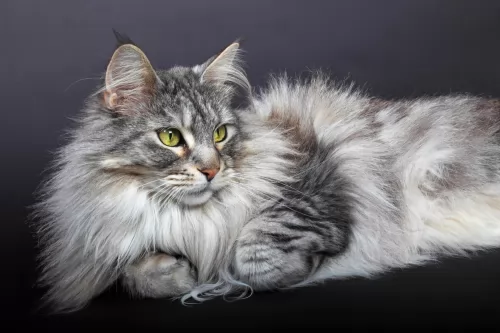 The Domestic Longhaired cat came about because of various attempts by breeders to bring in certain Persian cat varieties in the American Shorthairs.
The Domestic Longhaired cat came about because of various attempts by breeders to bring in certain Persian cat varieties in the American Shorthairs.
The cat comes from champion bloodlines but one of the most remarkable traits of the Domestic Longhair cat is that they are just typical cats with long hair. In other words, Domestic Longhairs are a product of various cat breedings and it is thought they arrived in the USA with the early settlers.
They shouldn’t be confused with the purebred American Longhair cat. The ancestry of the Domestic Longhair cat is unknown but for people who own them, they are a longhaired cat that becomes special to their owners. The cat isn’t recognized by the larger cat organizations.
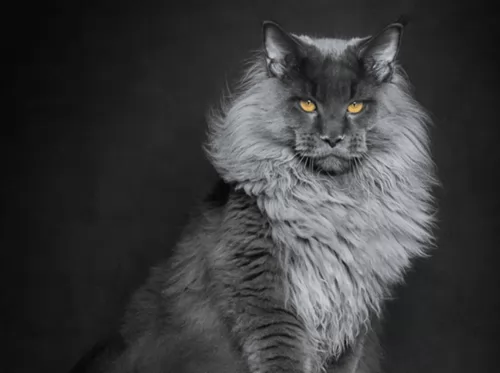 The Maine Coon cat hails from Maine, USA. It’s a natural cat breed with actually little being known of its exact origins.
The Maine Coon cat hails from Maine, USA. It’s a natural cat breed with actually little being known of its exact origins.
In fact, the first reference to the cat seems to have been in about 1861. It was in 1895 that a female Maine Coon was named Best Cat at a cat show held in Madison Square Gardens.
The Cat Fanciers Association was formed in 1908, and the 5th cat registered as a Maine Coon named Molly Bond.
The Maine Coon Breeders and Fanciers Association was formed in 1968. The cat is also the official state cat of Maine.
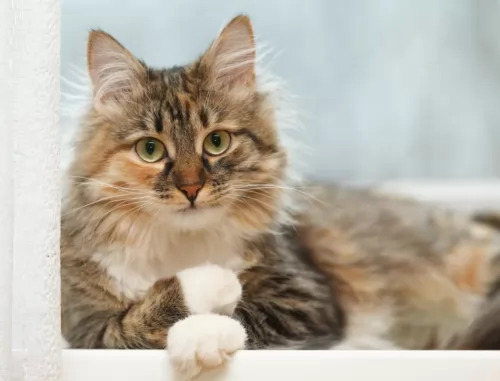 These Domestic long-haired cats are hugely popular in the United States. They can be of any color and the coat can have different patterns too, including bi-color, tortoiseshell and tabby.
These Domestic long-haired cats are hugely popular in the United States. They can be of any color and the coat can have different patterns too, including bi-color, tortoiseshell and tabby.
With his muscled, athletic body he can weigh between 3 and 6kg. He can have a variety of eye colors, ear sizes, and shapes Essentially, their size and shape is influenced by the breed that dominates.
These are just your regular, balanced cats and they make splendid pets for first-time cat owners, single pet owners, those with kids in the home and seniors. You can’t really tell how their personality will be and some will be more quiet than others and some more loving than others too. A lot depends on how you raise- and socialize your cat.
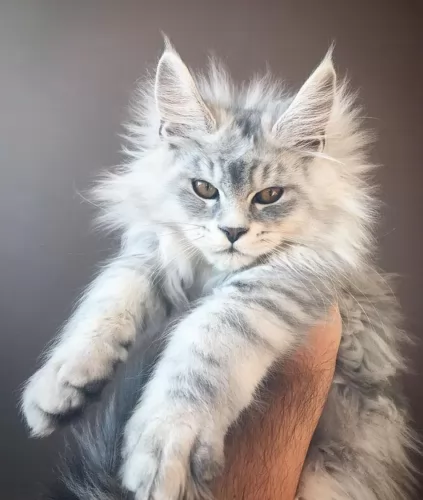 This is a large cat breed with strong bone structure. They can weigh between 5 and 9kg.
This is a large cat breed with strong bone structure. They can weigh between 5 and 9kg.
The height of these cats can be in the region of 25 and 41cm and they can reach a length of 97cm, including the tail. The body is muscular and robust with the chest being broad.
When it comes to the cat’s coat, the Maine Coon is characterized by the ruff along its chest. It has a 3-layered, water-resistant coat with longer hairs over a silky undercoat, and a long, bushy tail. The color of the coat can vary but the most common color is brown tabby. . It is medium- to long-haired. It’s a seasonal shedder with the fur being considerably thicker in the winter. All colors are available in this cat except blue.
The Maine Coon is a sociable cat and known for it playfulness as well as it being an intelligent cat and easy to train.
You’ll certainly need to supply the cat with some puzzle toys so as to stimulate his brain. It is also one of these cats known to have dog-like characteristics, becoming attached to its human owners, and being good-natured.
It is a loving cat and is also fairly vocal, wanting to tell its human owners what it wants. It’s not a lap cat. It is a gentle cat and gets on well with children and dogs as well as other cats.
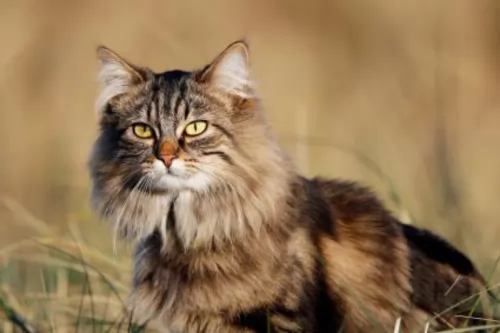 Domestic Longhairs are such wonderful cats and slot into a host of different lifestyles.
Domestic Longhairs are such wonderful cats and slot into a host of different lifestyles.
They are generally content cats with the different lifestyles they find themselves in. Some are smart, some playful, some quiet and some naughty, some are very vocal and some are content to be lap cats.
They're all different but they all have needs and concerns – to be part of a loving human family and to be treated with love, care and respect for the companionship they offer.
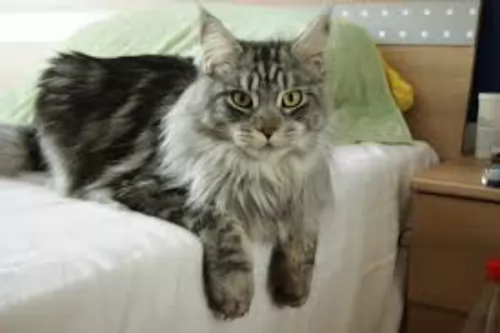 Maine Coon cats are such awesome pets and highly entertaining. They're excellent climbers too and to add to their many amazing characteristics, they love playing in water too.
Maine Coon cats are such awesome pets and highly entertaining. They're excellent climbers too and to add to their many amazing characteristics, they love playing in water too.
You’ll be doing him a favor by providing him with a paddling pool. They’re so clever, they may even learn to turn a tap on.
He is such a social, friendly, family-loving cat and it's not surprising that he’s a firm favorite with most cat lovers.
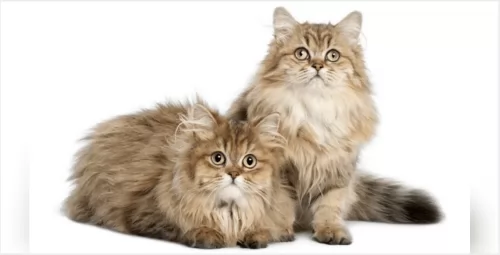 It is their mixed breeding that ensures that the Domestic Longhaired cat doesn’t have any health issues. Like any cat, things such as arthritis, cancer, diabetes and kidney disease can plague your cat.
It is their mixed breeding that ensures that the Domestic Longhaired cat doesn’t have any health issues. Like any cat, things such as arthritis, cancer, diabetes and kidney disease can plague your cat.
A good diet, exercise, lots of love and care can all help to ensure your kitty kat doesn’t succumb to anything that your vet can’t handle.
As soon as your cat shows any sign of illness, get him to the vet. If you look after your cat well, he can avoid a lot of vet visits and can reach 15 to 20 years of age.
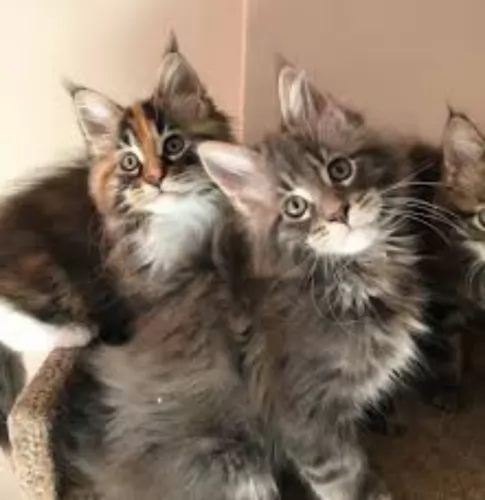 There are certain health problems that seem to occur in this particular cat breed, including hip dysplasia and feline hypertrophic cardiomyopathy.
There are certain health problems that seem to occur in this particular cat breed, including hip dysplasia and feline hypertrophic cardiomyopathy.
Hip dysplasia is a condition of the hip joint that can cause degeneration of the joints. It can lead to stiffness and pain for your cat and it can be that your cat develops osteoarthritis.
If your cat develops hip dysplasia it won’t want to jump, it becomes lethargic and there may even be muscle loss in the rear legs.
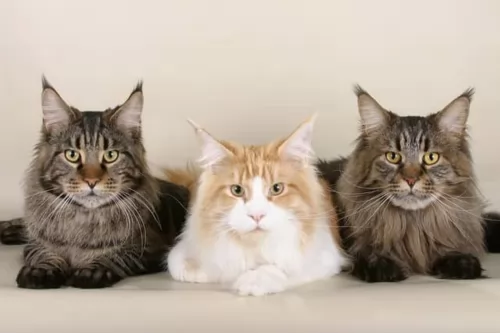 The hair of the Domestic Longhair will need to be tackled and you will need a firm brush to gently brush your cat once a week. This ensures the hair remains silky and tangle-free.
The hair of the Domestic Longhair will need to be tackled and you will need a firm brush to gently brush your cat once a week. This ensures the hair remains silky and tangle-free.
Remember, there are always professional cat groomers who specialize in grooming cats and ensuring their teeth, inside of ears, their nails and their fur is in tip-top condition.
Keeping your cat healthy is always going to require a trip to the vet. Your Domestic Longhair is going to require certain vaccines and deworming to ensure he remains free of deadly cat diseases. Also, if your cat is acting in a lethargic, ‘sick’ way, it could well be a sign that he is ill and a trip to the vet will be imperative as the condition could become worse.
To ensure your cat has the best chance at health, make sure you feed him well. Gut health is absolutely imperative and feeding your cat too many carbs will give him plenty of digestive problems.
A cat is a carnivore – a meat eater – and therefore his food needs to be meat. A kitten will require 4 small meals a day and an adult cat – over the age of 1 year – will require 2 meals a day. Any questions you have about feeding your cat can be answered by your local veterinarian.
Speak to your vet about spaying or neutering your Domestic Longhaired Cat as this will prevent unwanted kittens, particularly if your cat is allowed outdoors and wanders off.
Also, neutering and spaying have a host of health benefits for your cat and it also improves their personality.
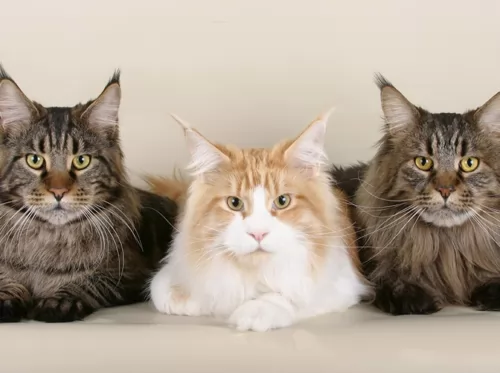 Cat owners need to realize that diet is one of the most important factors of keeping a cat healthy. The Maine Coon needs nutritious food.
Cat owners need to realize that diet is one of the most important factors of keeping a cat healthy. The Maine Coon needs nutritious food.
Some people give their cat a mix of dry kibble as well as wet food. It is better to feed your pet smaller meals as opposed to large meals. What is very important is that the cat food is of a high-quality and that it be made up of meaty protein as every cat is a carnivore.
Provide your Maine Coon with a litter box and put it in a quiet, private area. It’s a large cat so make sure the litter box is large as well. With a cat you may need to experiment with him to figure out where he prefers his litter box to be.
This is an active cat so ensure that he gets plenty of exercise. Provide him with climbing equipment and stimulating toys. Your Maine Coon might even enjoy going for a walk and for this, you’ll need to get a cat harness.
Every cat likes to scratch – it’s normal behavior. Make sure you have one or two scratching posts with heavy bases set up for your cat otherwise he may direct his scratching on your furniture.
Every cat owner needs to know a good vet in their area so that their pet can get immediate veterinary help when he becomes sick.
Your Maine Coon’s coat is thick – made up of 3 layers. To maintain its silky feel, and to prevent matting, make sure to brush it once or twice a week. Make it an enjoyable, gentle grooming session for your furry pet. Speak to your vet about the right kind of brushes.